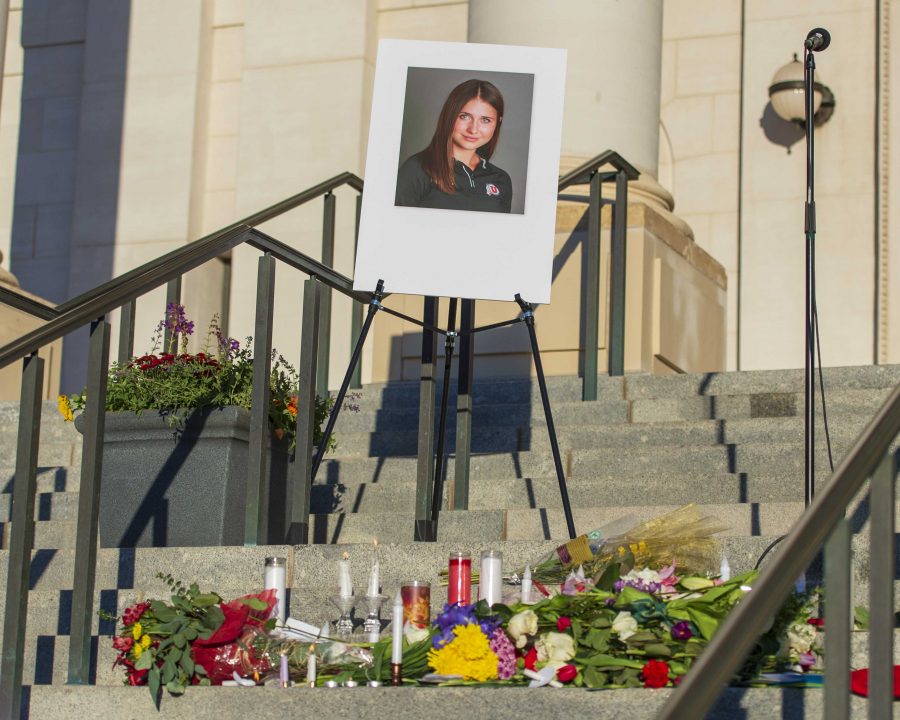Addressing the numerous dimensions of violence on campus is a difficult conversation. The fatal case of Lauren McCluskey changed that entirely this year at the U, however.
Numerous lawmakers, students and campus groups want to shift how we approach this topic and prevent incidents like Lauren’s in the future. Statewide and on campus, they want change sooner than later.
Newly-elected Rep. Andrew Stoddard proposed a bill called Lauren’s Law. This legislation prosecutes those found responsible for lending a gun to an individual committing a crime using the weapon.
“What I intend for the bill to do is to create a presumption of civil liability so if someone were to loan their gun to somebody else who then use it to commit a felony then the original gun owner would be held civilly liable or could be held civilly liable.”
Before his foreway into this year’s legislative session, Stoddard has worked as a prosecutor and has done so the past seven years in the state. Before, he’s led work in domestic violence— both as a victim’s attorney and in victim advocacy.
“Hopefully, it will increase awareness in terms of gun owners and you know if something awful were to happen. Hopefully, it provides the victims with an easier way to seek civil redress if that’s what they want to do,” said Stoddard.

Stoddard is aware of gun owners who criticize the bill, citing concerns of state power minimizing their second amendment rights. “A lot of people just don’t like it because they know it requires them to be more responsible in who they’re loaning their gun out to,” said Stoddard.
Currently, the bill is undergoing the drafting process and the Representative aims to send it to the floor during the legislative season. Currently, he says it’s unclear on how much support is drumming up for this legislation but knows for certain it will receive some pushback.
“I know it’s going to be somewhat of an unpopular bill with some legislators and that’s okay. These are important discussions that we need to have. I’m optimistic that it will pass,” said Stoddard.
On campus at the U, there are students and allied faculty members engaging in activism. Most of these matters relate to sexual assault, domestic violence and what they believe was an institutional failing for Lauren McCluskey who was killed by her ex-boyfriend earlier this year.
It’s On Us
Meet Christina BargeIt, the president of It’s on Us. The group, located at the U, focuses on awareness and accountability matters when talking about domestic violence and sexual assault on campus. According to BargeIt, the death of Lauren has shaped campus politics and taken on a new meaning for the group.
Established four years ago, it’s affiliated as part of a broader network of other campus groups intent on combatting similar concerns. The modern organization was launched during President Obama’s administration in response to staggering data disclosing concerning rates of sexual assault on campuses across the United States. It is no longer affiliated with the White House, but maintains its headquarters in Washington, D.C.

“I’m interested to see how this is going to go down,” said BargeIt on the health of Stoddard’s bill when it lands on the floor this session. BargeIt speaks on behalf of her personal vantage point but also shares the views of her group and their work.
“I feel like the state is largely conservative in a lot of ways, and even though this tragedy occurred [which] is very visceral and very real for a lot of people. Especially on our campus. I’m not sure how much of an impact it had on the greater community,” said BargeIt.
The group focuses on practicing affirmative consent and relevant programming bent on reaching out to students, emphasizing on diversity.
BargeIt says Lauren’s Law is a practical step to holding certain individuals accountable, but to use the legislation as symbolic removes the human quality and leaves the life of Lauren as abstract— embedded in only a law.
“I try to make decisions for It’s On Us in my presidency, the way I interact with others and how I inform nationals about what’s going on our campus— is all informed by Lauren,” said BargeIt.
It’s On Us currently has a line of communication with President Ruth Watkins regarding their concerns and ideas of the action needed to transform campus safety.
BargeIt illustrates that “a lot of administrators nationally and even our university aren’t open to the student voice. I think the student voice, in this case, is one of the powerful ones— especially in the fight against sexual violence and partner violence.”
Many students believe campus police contributed to what seemed feckless handling of the incident. BargeIt agrees, but said, “they shouldn’t be completely slammed.” She also brings up the U’s Housing and Residential Education, where perhaps some fixture of resignations could pose helpful to accountability on campus.
The group’s power relies on the volume of student input about how to tackle the persisting issues of campus violence, according to BargeIt. “I want to hear you. I want to talk to you. Everybody’s voice is important,” said BargeIt.
“We have the opportunity to change the game here in campus safety,” BargeIt asserts firmly.
Other efforts on campus include Greek organizations. Alpha Chi Omega, a sorority, directs their philanthropy efforts to highlight domestic abuse awareness. Beta Theta Phi, a fraternity, is involved in rape prevention and talking about consent, a popular issue that has sustained for many campuses and many years across the country.
Lauren’s Law
Rep. Angelo Romero is another member and Democrat in the House— staunch on protecting victims of domestic violence in Utah and addressing gaps in the system.
“What’s really important is that victims also have a voice and that they’re very aware of what their rights are. Overall that’s my goal as an elected official is to ensure that in particular victims and survivors of sexual assault, domestic violence and human trafficking have just as much support as their perpetrators,” said Romero on her investment towards these issues.
Romero recently revived H.B. 19, a proposed bill that has garnered bipartisan support which backs victims when their offenders are released from jail.

The bill addresses protection for victims, but largely addresses the shortcomings of Utah’s justice system, including instituting an easier and accessible transaction for the victim and authorities.
What outreach would look for the those affected in Utah, Romero said, “I think it helps universally in these cities and occurrences on a college campus.”
Mentioning Lauren’s Law, Romero tells the Daily Utah Chronicle when it arrives on the floor, she will support the bill.
“But I think we have to take stronger steps ensuring that we’re protecting people’s safety,” Romero said.
According to her, this looks more like correcting the pitfalls in the criminal justice system and police departments following a code of believing victims of abuse and responding more effectively. In an op-ed last week in the Salt Lake Tribune, Jill McCluskey, the mother of Lauren, also pens the systemic operations at the U failed to protect her daughter from being killed earlier this academic year.
“Remarkably, the university’s position is that there is no reason to believe that her death could have been prevented. If that were true, then fixing the flaws in the system would be a pointless exercise,” said McCluskey.
The U has since responded in a statement shortly after, acknowledging the misgivings of the incident, the stumbles in protocol from the University Police and further clarified it remains unclear whether this case could have been prevented. Two independent reviews from the U and the state will be conducted on the U’s Campus Police Department. In an earlier article by the Daily Utah Chronicle this past December, Elise Vandersteen Bailey reports the reviewers who will investigate have already pointed out the many issues found from the handling of Lauren McCluskey’s case.

”Among the problems found by the reviews are issues with three state justice system databases that— at least in part— prevented officers from discovering Rowland was on parole, staffing shortages in the police department, insufficient training of police officers to deal with dating violence cases and poor cooperation between separate departments on campus,” said Bailey.
On another campus in Utah, there has been a 400 percent increase in BYU students’ reports to the Title IX Office, according to a recent article published by KSL. This increase is a good thing according to Dr. Julie Valentine, a professor at BYU. She comments in the article, “It doesn’t mean that there are more sexual assaults occurring. What it means is that victims are starting to trust the system.”
At Utah State University, the recent charging of rape for their former football player sparked cultural conversations on the campus, surrounding topics like the #MeToo Movement and believing those who report sexual assault to authorities. The insistence of a changing culture in domestic violence, sexual assault and abuse seems likely to remain for the rest of the year on the U’s campus and the state. For many, how we conduct change will also join alongside in a moment of our nation’s social contention.
If you have been a victim of domestic violence or know someone affected, please contact the Victim’s Advocate Office at 801-581-7779.



